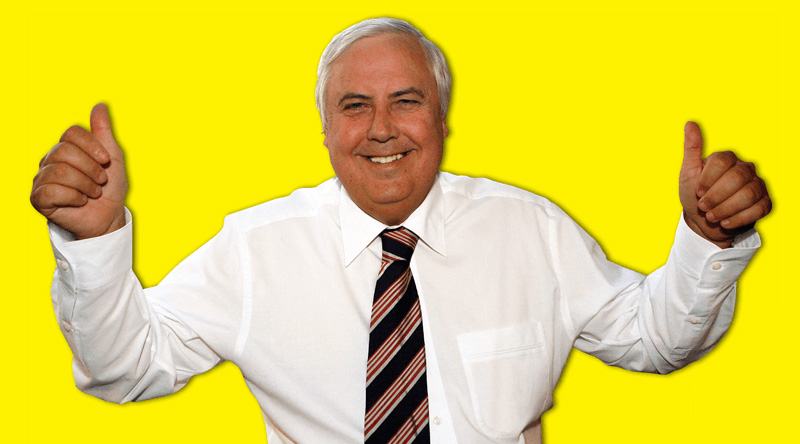It’s all about me!
What might the sudden popularity of eponymous political parties in Australia say about the motives of those who found them?
There are all sorts of good reasons why a person may choose to start a political party. When Sir Robert Menzies became frustrated with the United Australia Party and their disinterest in small business, he famously walked out with half the cabinet and formed the Liberal Party of Australia. His actions led to the formation of one of the two great Australian political parties of the twentieth century. Likewise when Don Chipp left the Liberals to lead the Australian Democrats, his was the face of a party that would influence governments for decades.
But what if on that fateful day in 1944, Robert Menzies decided to name his creation the “Robert Menzies League”? Would it have become the success that it is today? Would the Democrats have been taken so seriously if they were named the “Don Chipp Collective”? Probably not.
The popularity of eponymous political parties has skyrocketed in the past few years. The earliest example that I can think of is Pauline Hanson’s One Nation, which was formed in 1997. Ms. Hanson was expelled from her own party in 2002 and the reference to her name was deleted (she’s since returned). Clearly the brand confusion that resulted from her departure phased no-one.
In 2011, maverick Queensland MP (and former member of the National Party) Bob Katter formed Katter’s Australian Party to peruse his agenda of agrarian socialism. Katter’s Australian Party clearly relies on the Mad Katter’s eccentricities and household name in order to propel itself, but it has won a few seats in his home state.
Of course, Katter is a mere sidenote in the world of self-aggrandisement when compared to Queensland mining magnate Clive Palmer. In 2012, Mr. Palmer sought pre-selection for the Liberal National Party in Queensland but things didn’t go so well. As a result, Mr. Palmer founded the Palmer United Party, a name that would later prove ironic. PUP contested the 2013 Australian federal election where Palmer himself won the Queensland seat of Fairfax and several other senators were elected.

Unfortunately things weren’t so united at the Palmer United Party. Senator Jacqui Lambie quit PUP in 2014 and Glenn Lazarus left soon after. (Palmer also lost two Queensland state MPs in Alex Douglas and Carl Judge). Following the lead of their former leader, Jacqui Lambie founded the Jacqui Lambie Network whilst Glenn Lazarus founded the Glenn Lazarus Team.
Never one to miss out on a bit of self-promotion, high-profile founder of Dick Smith Electronics and Dick Smith Foods, Dick Smith launched the Dick Smith Party in the very same week at the Jacqui Lambie Network was registered.
Whilst eponymising one’s own political party is de rigueur these days, it raises a serious question about whether such an entity can ever be truly democratic. If a political party names itself after its founder rather than its philosophy or cause, there may be a certain expectation that the party is there to serve or elevate the interests of that named person ahead of other considerations.
What happens if the party’s membership disagrees with the leader? Stranger things have happened.
Under the Electoral Act 1918, a person must demonstrate that there are at least 500 electors who are members of an organisation prior to its registration as a party (Sect. 126). Unfortunately this criterion does not exist when a member of parliament decides to found a party. In those circumstances, the membership can be 1.
All of the truly successful political parties in Australia have advanced the interests of a significant community, be they farmers (Nationals), employers (Liberals), employees (ALP) or environmentalists (Greens). Political parties should reflect the interests of a community or interest group and not exist to advance a single person’s interest or boost their ego and sense of legitimacy.
The Australian community’s dissatisfaction with politics is a well-documented phenomenon evidenced by a significant decline in votes for either of the two major political parties. This provides solid evidence that the public are looking for genuine alternatives to Labor and the Liberals, but those alternatives will not be found in egocentric ‘movements’ with one figure at the helm. Success can be achieved by strong independent parliamentarians without the pretence of a pseudo-movement behind them. Senator Nick Xenophon of South Australia provides a good example.
Democratic societies do not institute unnecessary obstacles to the creation of new political parties, but politicians would be well advised to consider carefully the objectives of any political party they found. Particular consideration should be put into the community that they serve and the philosophy that determines their policy and direction. That way, they will hopefully create a genuine movement that will not only endure, but make a significant and material improvement to the lives of the community they serve and the nation as a whole.
Comments
One response to “It’s all about me!”
Xenophon will never have true political power, but how much more effective he is without it. Some, not all, independents have been very effective in both Federal and State parliament.